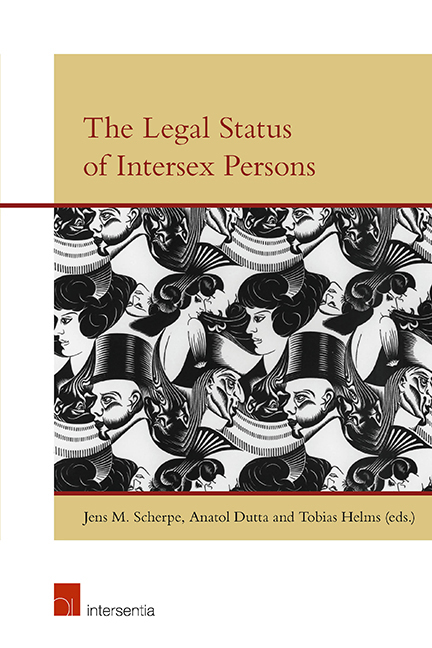Book contents
- Frontmatter
- Preface
- Contents
- List of Contributors
- The Legal Status of Intersex Persons: An Introduction
- Malta Declaration
- Darlington Statement
- Vienna Statement
- PART I MEDICINE AND PSYCHOLOGY
- PART II THEOLOGY AND LEGAL HISTORY
- PART III TRANSGENDER, TRANSSEXUALITY AND INTERSEX
- PART IV NATIONAL LEGAL DEVELOPMENTS
- Australia
- Sweden
- India
- The Netherlands
- France
- Colombia (The Colombian Constitutional Court)
- United States
- Malta
- Germany (The 2013 German Law)
- Germany (German Inter-Ministerial Working Group)
- Germany (Gender Diversity in Law)
- PART V PRIVATE INTERNATIONAL LAW ASPECTS OF INTERSEX
- PART VI INTERSEX AND HUMAN RIGHTS
Germany (The 2013 German Law)
from PART IV - NATIONAL LEGAL DEVELOPMENTS
Published online by Cambridge University Press: 31 January 2019
- Frontmatter
- Preface
- Contents
- List of Contributors
- The Legal Status of Intersex Persons: An Introduction
- Malta Declaration
- Darlington Statement
- Vienna Statement
- PART I MEDICINE AND PSYCHOLOGY
- PART II THEOLOGY AND LEGAL HISTORY
- PART III TRANSGENDER, TRANSSEXUALITY AND INTERSEX
- PART IV NATIONAL LEGAL DEVELOPMENTS
- Australia
- Sweden
- India
- The Netherlands
- France
- Colombia (The Colombian Constitutional Court)
- United States
- Malta
- Germany (The 2013 German Law)
- Germany (German Inter-Ministerial Working Group)
- Germany (Gender Diversity in Law)
- PART V PRIVATE INTERNATIONAL LAW ASPECTS OF INTERSEX
- PART VI INTERSEX AND HUMAN RIGHTS
Summary
This chapter discusses the 2013 German civil status law regarding intersex. After a quick look back on the law before the reform in 2013, the first focus will be on the interpretation of the 2013 law and its consequences for German family law as a whole. Then the ground-breaking decision of the Federal Constitutional Court of 10 October 2017 will be looked at. In this decision, the Federal Constitutional Court ruled that the reform of 2013 (which explicitly allowed leaving the gender entry blank when an intersex child is born) had not gone far enough and that German civil status law must allow a third ‘positive’ gender option. Finally, this chapter will ask whether we can do without gender as a legal category completely.
THE BINARY SOCIAL (GENDER) ORDER
The categorisation of human beings as part of either the female or the male sex is seen as natural and self-evident in everyday life. When relatives or friends inform us that they are expecting off spring, one of the first questions is always: ‘A boy or a girl?’ When we meet someone for the first time we automatically assign that person to one of the gender categories, even before learning their name or having spoken to them. Should we not immediately succeed with this gender categorisation, we become irritated to the extent that we are literally rendered speechless. After all, the German language has no personal form of address that does not use the words ‘Frau’ or ‘Herr’. We essentially cannot imagine life without gender categorisation.
The binary gender system is deeply rooted in the history of civilisation and of mankind. As Verse 27 of the Book of Genesis famously states: ‘God created man in His own image, … male and female He created them.’ The attraction between the sexes is the basis for the propagation of the human species. It shapes our mating conduct and social behaviour and – to a certain extent – continues to determine the power structures of human society. Nonetheless, throughout history there has always been a certain level of awareness of the fact that there are humans that do not fall into the usual sex categories.
- Type
- Chapter
- Information
- The Legal Status of Intersex Persons , pp. 369 - 382Publisher: IntersentiaPrint publication year: 2018
- 1
- Cited by

